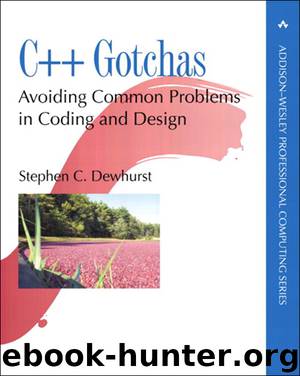C++ Gotchas: Avoiding Common Problems in Coding and Design (Jason Arnold's Library) by Stephen C. Dewhurst

Author:Stephen C. Dewhurst
Language: eng
Format: epub
Publisher: Addison-Wesley Professional
Published: 2010-03-24T16:00:00+00:00
Gotcha #57: Direct Argument Initialization
We all know that formal arguments are initialized by actual arguments, but by what kind of initialization—direct or copy? That should be easy to test experimentally:
class Y {
public:
Y( int );
~Y();
private:
Y( const Y & );
// . . .
};
void f( Y yFormalArg ) {
// . . .
}
// . . .
f( 1337 );
If argument passing is implemented as a direct initialization, the call to f should be correct. If the argument is initialized with copy initialization, the compiler should issue an error about the implicit attempt to access the private copy constructor for Y. Most compilers will permit the call, so we might conclude that argument passing is implemented with direct initialization. But most compilers are wrong, or at least out of date. The standard says that argument passing is accomplished with copy initialization, so the call to f above is incorrect. The initialization of yFormalArg is entirely analogous to the declaration below:
Y yFormalArg = 1337; // error!
If we want to write code that’s standard, portable, and that will remain correct as compilers move to implement the details of the standard, we should avoid writing code like the call to f.
There may also be performance issues. If the function that calls f had access to Y’s private copy constructor, the call would be correct but would mean something like the following:
Y temp( 1337 );
yFormalArg( temp );
// body of f . . .
yFormalArg.~Y();
temp.~Y();
In other words, the initialization of the formal argument would consist of a temporary creation, copy construction of the formal argument, destruction of the formal argument on function return, and destruction of the temporary. Four function calls, not counting the call to f. Fortunately, most compilers will perform the program transformation to get rid of the temporary generation and copy constructor and will generate the same object code that would have been generated for a direct initialization:
yFormalArg( 1337 );
//body of f . . .
yFormalArg.~Y();
However, even this solution is not optimal in all cases. What if we initialize yFormalArg with a Y object?
Y aY( 1453 );
f( aY );
Here we will have a copy construction of yFormalArg with aY and destruction of yFormalArg on return from f. A much better solution is to avoid, if possible, passing class objects by value in favor of passing by reference to constant:
void fprime( const Y &yFormalArg );
// . . .
fprime( 1337 ); // works! no copy ctor
fprime( aY ); // works, efficient.
In the first case, the compiler will create a temporary Y initialized with the value 1337 and will use this temporary to initialize the reference formal argument. The temporary will be destroyed immediately after fprime returns. (See Gotcha #44, where I discuss the extreme danger of returning such an argument.) This is equivalent in efficiency to the transformed solution above and has the additional benefit of being legal C++. The second call to fprime incurs no temporary generation overhead at all and, in addition, avoids the necessity of a destructor call on return.
Download
This site does not store any files on its server. We only index and link to content provided by other sites. Please contact the content providers to delete copyright contents if any and email us, we'll remove relevant links or contents immediately.
| Ada | Ajax |
| Assembly Language Programming | Borland Delphi |
| C & C++ | C# |
| CSS | Compiler Design |
| Compilers | DHTML |
| Debugging | Delphi |
| Fortran | Java |
| Lisp | Perl |
| Prolog | Python |
| RPG | Ruby |
| Swift | Visual Basic |
| XHTML | XML |
| XSL |
Hello! Python by Anthony Briggs(9424)
OCA Java SE 8 Programmer I Certification Guide by Mala Gupta(9389)
The Mikado Method by Ola Ellnestam Daniel Brolund(9353)
Algorithms of the Intelligent Web by Haralambos Marmanis;Dmitry Babenko(7896)
Sass and Compass in Action by Wynn Netherland Nathan Weizenbaum Chris Eppstein Brandon Mathis(7440)
Test-Driven iOS Development with Swift 4 by Dominik Hauser(7414)
Grails in Action by Glen Smith Peter Ledbrook(7333)
The Well-Grounded Java Developer by Benjamin J. Evans Martijn Verburg(7161)
Secrets of the JavaScript Ninja by John Resig Bear Bibeault(6006)
Kotlin in Action by Dmitry Jemerov(4684)
Hands-On Full-Stack Web Development with GraphQL and React by Sebastian Grebe(3992)
Functional Programming in JavaScript by Mantyla Dan(3743)
Windows APT Warfare by Sheng-Hao Ma(3104)
Learning Java by Patrick Niemeyer & Daniel Leuck(2891)
Mastering Python for Finance by Weiming James Ma;(2879)
Learning React: Functional Web Development with React and Redux by Banks Alex & Porcello Eve(2865)
Layered Design for Ruby on Rails Applications by Vladimir Dementyev(2798)
WordPress Plugin Development Cookbook by Yannick Lefebvre(2689)
Mastering Java 9 by Dr. Edward Lavieri(2584)
